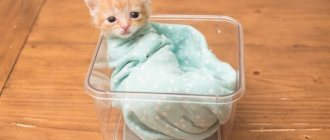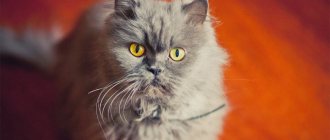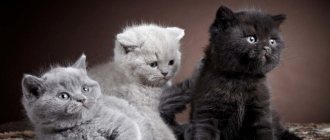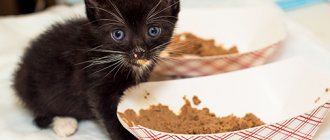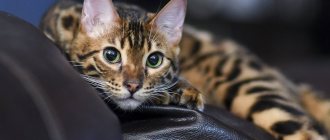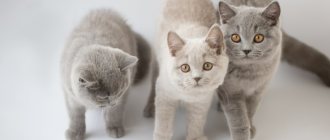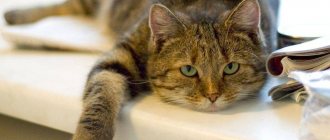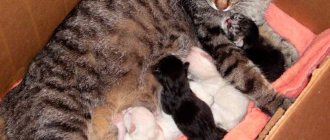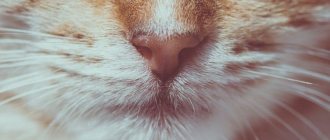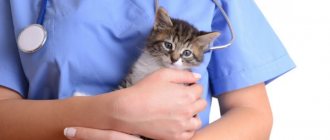Our beloved cats are the most important couch potatoes. Their activity time is much shorter than their resting state. Because of this feature, owners often worry, wondering why their cats sleep so much. Despite the suspiciously high duration, in most cases, cat naps are explained by completely harmless reasons.
Sleep standards for cats by age
All representatives of the cat family are nocturnal predators. They use daytime sleep to digest prey and recover before hunting again. Unlike their wild relatives, domestic pets are not burdened with the burden of searching for food. That's why it seems to us that cats sleep all the time. This is partly true.
In kittens
Newborn kittens sleep all the time, since any activity takes a lot of energy from them. Their sleep duration can be up to 23 hours. By 1 month it is reduced by only a couple of hours. At first, babies wake up only to eat.
The kitten sleeps a lot until 4-5 months. At this age, he is already confidently standing on his paws, becoming independent and more actively engaging in joint games. His rest hours gradually decrease and begin to correspond to those of adult animals.
In mature individuals
The average sleep duration in adult cats is 14-16 hours. But, if your pet sleeps 20 hours and feels good, then this is also normal. Besides age, there are many other reasons that may explain increased sleepiness.
In older animals
A reverse jump towards increased sleep is observed after 8 years. If your pet is no longer a kitten, but constantly sleeps for more than 20 hours, then the matter is that its internal processes are slowing down. Older animals lose their activity and need longer energy recovery.
What else affects sleep duration?
In addition to age, other internal factors, as well as some external ones, influence individual sleep duration. Because of this, pets of the same age require completely different amounts of time to rest.
Satiety
If a cat sleeps peacefully all day, then he does not feel hungry. He uses all this time to digest food. Animals that eat high-protein foods rest especially long.
Physical activity
The energy spent during outdoor games is restored during sleep. But this does not mean that the main couch potatoes are energetic and playful pets. In their case, the time of falling asleep coincides with the end of the game. Having recharged, they are ready for new adventures.
External (including weather) conditions
The calmer, more comfortable and quiet the environment in the room, the easier it is for the animal to fall asleep. Pets sleep the longest when their owners are away. If you install hidden cameras, you can see that the mustachioed pets get up just to drink water.
Sleep duration increases during rainy weather and hot summers. If your pet rests for a long time during the heating season, then dry air is to blame.
Some animals are sensitive to weather conditions. If it’s gray and rainy outside, the pet will sleep almost all the time, except for feeding and going to the toilet.
Breed
The character traits of different breeds are no less important. Persians, Ragdolls, Devon Rexes, Britons and Scots sleep the longest. They are quite lazy and often fall asleep immediately after eating.
More active breeds include Abyssinians, Siberians, Bengals, Siamese, Kurilian Bobtails and Egyptian Mau. Representatives of these breeds love active games with their owner and hunting, so with enough attention they are constantly on the move.
Health status
Representatives of the cat family are good at capturing other people's emotions. A quarrel between beloved owners can cause them great anxiety and worry. When under constant stress during a move or other exciting event, they will hide in secluded places and sleep longer than usual. Also, the reason may lie in the disease.
Sleep phases
The sleep of mustachioed pets consists of two constantly alternating phases: slow and fast. During the first phase, the animal dozes. Despite the slowdown in heart rate, breathing and metabolic processes, his muscles remain tense and his brain remains active. This maintains the sensitive response to external stimuli necessary for survival.
A curled up cat quickly and easily wakes up if disturbed by its owner or a loud sound. The slow phase lasts no more than 30 minutes.
In the absence of stimuli, the first phase flows into the second. At this stage, the body is completely relaxed, so you can see twitching of the paws, eyelids and whiskers. The duration of the fast phase is no more than 7 minutes.
For homeless animals it is shorter, since it is very difficult to wake up at this time. Losing control over what is happening can result in death. Pets do not have this problem - the safer he feels, the longer his fast phase.
What does a sleeping cat “talk” about?
If a cat cannot relax even in sleep, or prefers to hide in order to get enough sleep, this may indicate disharmony in the relationship with the owner . This situation needs to be corrected urgently.
A cat that has unlimited trust in its owner usually:
- sleeps in the same bed with him;
- tries to fall asleep next to him, leaning on his side;
- loves to sleep on the owner's lap;
- sleeps on his back, with his belly out and his paws outstretched.
Of course, the duration of sleep for a kitten or cat is strictly individual for each animal. However, no matter how much your pet sleeps, if at the same time he feels safe and demonstrates this in every possible way, congratulations - you managed to win his trust and love!
Why did my cat sleep longer than usual?
Increasing your sleep duration is not a reason to panic. It is inappropriate to draw hasty conclusions based on this fact alone. Watch your pet. In the absence of alarming symptoms, the changes that have arisen are explained by completely natural and harmless reasons.
Natural causes
Natural causes are associated with the physiological characteristics of the body. These include:
- Boredom. If a cat is constantly sleeping, then they are just bored. Being pets, they are deprived of the need to search for food and sleep. This directly affects activity and is fraught with weight gain. To save your pets from obesity, you need to regularly engage them in active games.
- Pregnancy. Bearing offspring is a very labor-intensive process that takes a large amount of energy.
- Uncontrolled feeding. Veterinarians do not recommend pouring food in enormous proportions. Due to this feeding, animals often overeat, so they take longer to digest. Constant stress on the stomach can lead to unpleasant consequences.
- Extreme fatigue. If a city dweller is taken out into nature, he can spend the whole day catching birds and mice. In this case, sleep is explained by prolonged wakefulness and physical activity.
- Taking sedatives. Sedatives lead to lethargy, reducing activity time. The animal’s condition returns to normal after they are discontinued.
- Recent illness, vaccination or antibiotic treatment. Infections and antimicrobial drugs hit the body hard. Feeling lethargic and overwhelmed, the pet rests longer than usual.
For these reasons, the owner can only watch his pet and not interfere with its recovery. Over time, he will return to his usual rhythm.
After castration
If a cat sleeps after sterilization, then the reason for its drowsiness lies in the anesthesia. During the first 24 hours after surgery, the pet will refuse food and water in favor of sleep.
During the recovery period, coordination is also impaired. To prevent injury, the owner should monitor his pet until she returns to normal activity.
In addition to operations to remove reproductive organs, a similar effect is observed with any surgical intervention under general anesthesia. If the manipulations were performed under sedation, then such deviations are not observed.
Possible diseases and their symptoms
One of the dangerous causes of frequent sleepiness is obesity. Excess weight complicates habitual movements and is fraught with many internal diseases. Regularly monitor your pet's weight to prevent complications from developing.
If an animal is sick, then, in addition to drowsiness, it exhibits:
- hot and dry nose;
- pallor of mucous membranes;
- inflammation of the lymph nodes;
- increased temperature and rapid pulse;
- diarrhea and vomiting;
- itching, dullness of fur and hair loss;
- poor appetite, thirst, or refusal to drink water;
- bad breath and coating on the tongue;
- tearing and redness of the eyes;
- runny nose and breathing problems.
Similar symptoms are typical for allergies, poisoning, helminthiasis, infections, diseases of the urinary, cardiovascular and digestive systems. To find out the exact cause, you need to contact a veterinary clinic. Doctors do not recommend self-diagnosis, since incorrect guesses by the owners can result in the death of the animal.
When long sleep is a sign of illness
A kitten's long sleep should not cause concern to the owner. But you should be wary if, in addition to the constant need for rest, the kitten shows other signs of illness. For example, he refuses food and water, often visits the litter box, the coat becomes dull and brittle, and the temperature is elevated.
It is very difficult for the owner to determine why the kitten is feeling unwell based on these symptoms, so you need to contact a veterinarian. He will prescribe the appropriate treatment, after which the kitten’s sleep problems will disappear.
Increased drowsiness can be a symptom of diseases such as inflammation of internal organs, helminthiasis, viral infection, and the development of a cancerous tumor.
Prevention and timely diagnosis of diseases will increase the pet’s quality of life.
Excessive sleepiness may be a cause of illness
